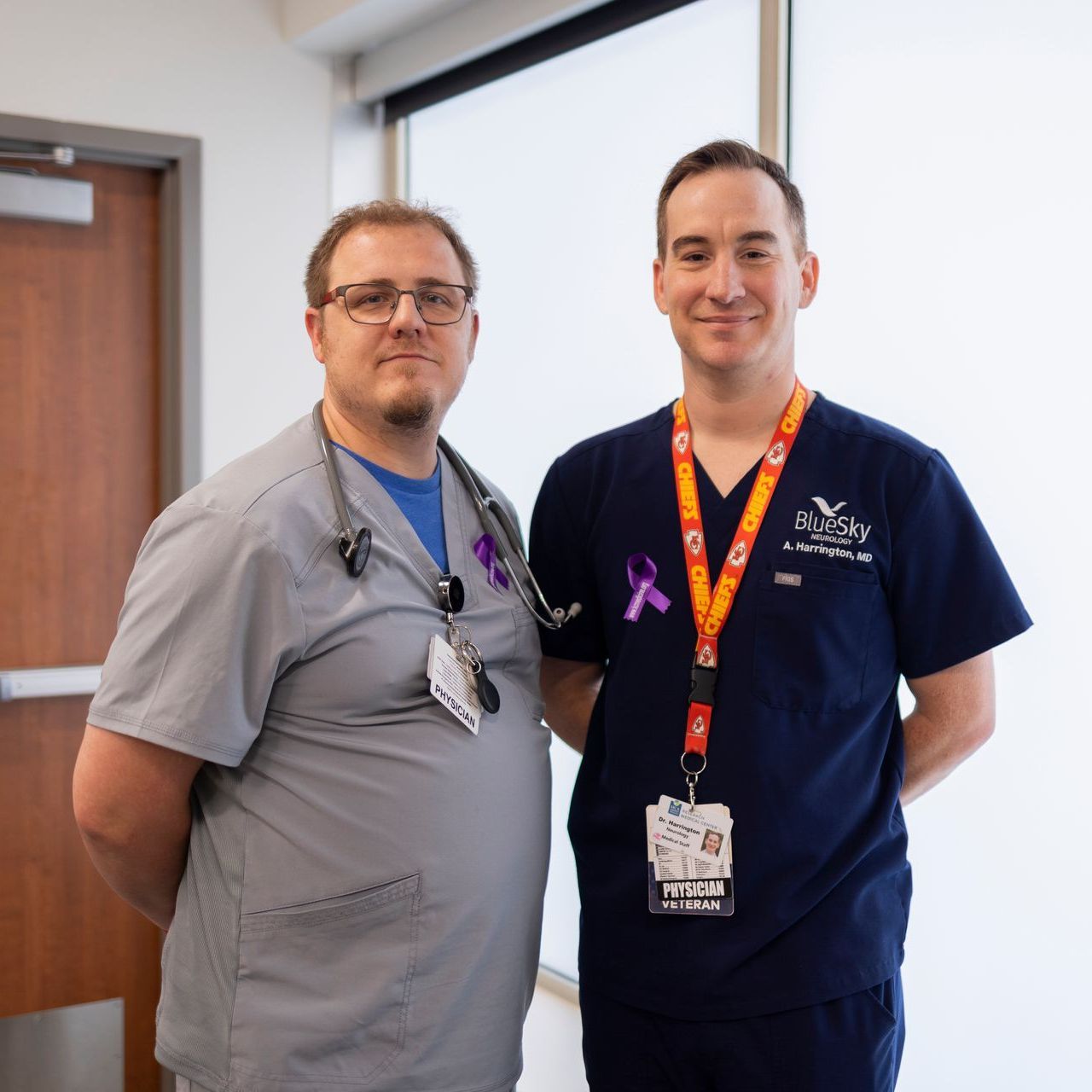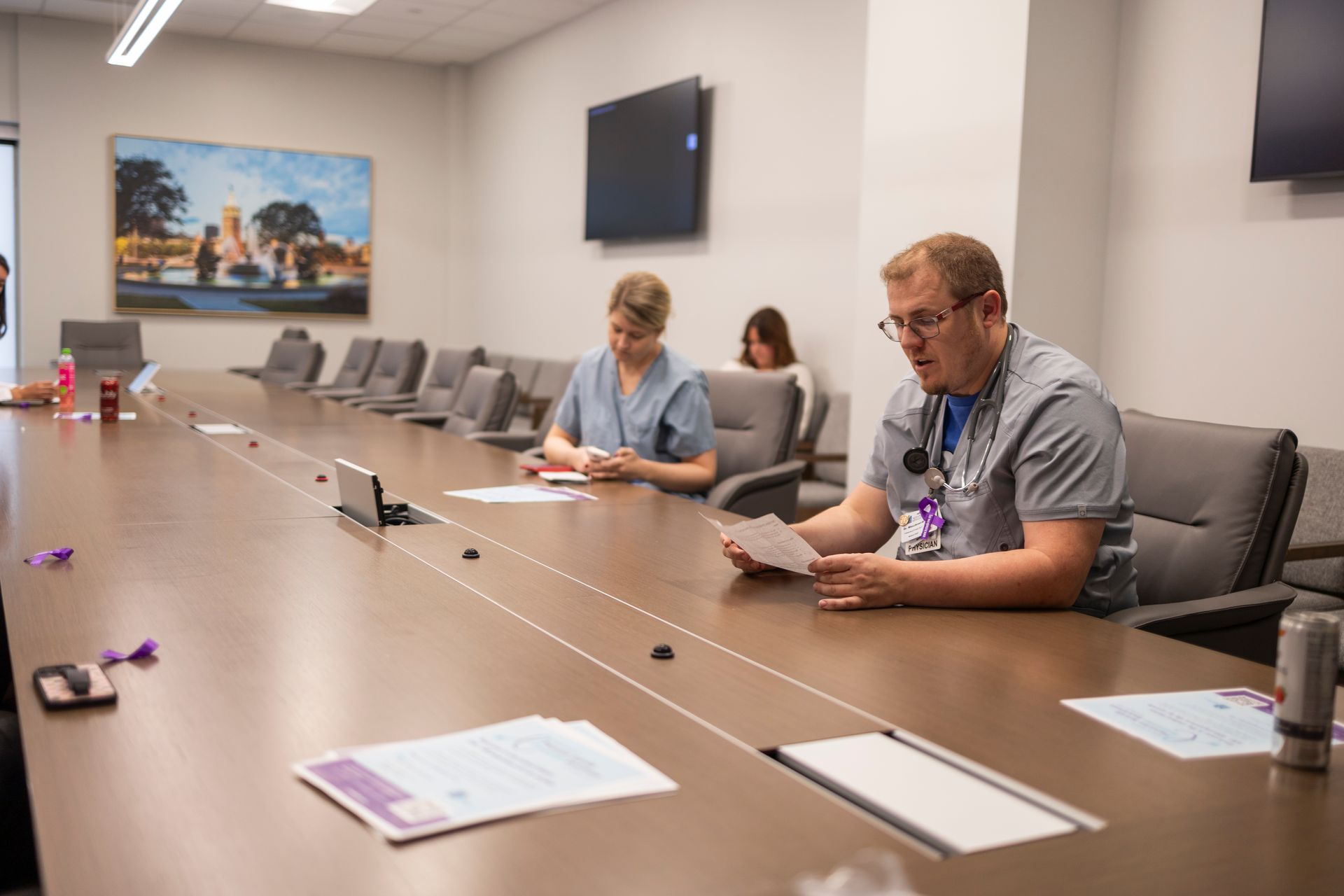2024 Physician Suicide Awareness Campaign
Kansas City area hospitals turn out for Physician Suicide Awareness Day: September 17th, 2024
In a showing of honor and support for spreading awareness around the issue of Physician Suicide, hospitals around the Kansas City metro participated through both education and a Moment of Silence honoring their fellow coworkers and families affected by suicide. Brian Mieczkowski, MD of Research Medical Center led an informative session that educated fellow staff members of the staggering numbers of suicide in the US medical profession every year. He offered resources and support for those who are struggling with burnout and depression. For more information on the affects of Physician Suicide and further resources, visit our Physician Suicide Resource Page.
KCMS had the honor of interviewing two local physicians who offered their expertise and advice on the topics of burnout, depression, and suicide in the medical industry:

Pictured left to right: Brian Mieczkowski, MD; Anthony Harrington, MD
Anthony Harrington, MD
Neurologist, Research Medical Center and KCMS Leader
Dr. Anthony Harrington is a neurologist with Blue Sky Neurology at Research Medical Center. He grew up in Overland Park, Kansas, and after serving in the Marine Corps, he attended the University of Colorado for college. He completed medical school at the University of Kansas, followed by residency in Colorado and a stroke fellowship at the University of Michigan.
Passion for being a Physician:
"I have a strong calling to medicine, much like I did in the military. Neurology, in particular, fascinates me due to the connection between the brain and the body through electrical pathways, which has always intrigued me."
Challenges of being a Physician:
"One challenge is navigating the emotional toll of being with patients and families during their darkest moments, especially when life-and-death decisions are at stake. Physicians often struggle with asking for help, feeling the need to shoulder burdens alone, which can be overwhelming."
What are some available resources for struggling physicians?
"While some resources exist, such as connections with psychiatric groups and online options, I feel there is a need for more dedicated mental health support for physicians, particularly in community hospitals. I believe provider wellness programs and mental health counselors are essential during challenging times."
Why do you believe there are higher suicide rates among Physicians than in other industries?
"I attribute the higher suicide rates among physicians to high stress, heavy workloads, and the stigma surrounding mental health. The reluctance to seek help, whether through therapy or medication, exacerbates the problem."
Final thoughts:
"We need to bring issues like depression, mental health, and substance abuse out of the shadows. I believe the only way to address these challenges is for physicians to support one another and work together to create change."

Pictured left to right: Brian Mieczkowski, MD; Anthony Harrington, MD
Joanne Loethen, MD
Primary Care Physician, UH-KC and KCMS Leader
Dr. Joanne Loethen is a primary care physician practicing both internal medicine and pediatrics. Her day-to-day involves seeing a wide range of patients, from children to adults. She loves the challenges that come with her job but, above all, enjoys helping patients live their healthiest lives.
Tell us about your passion for medicine
"I am driven by my connection with patients. I find it rewarding to help them overcome health challenges and improve their quality of life. However, barriers such as financial, social, and transportation issues can make it difficult to provide patients with the care they need, which is particularly frustrating."
In your opinion, what challenges lead to Physician burnout and suicide?
"Many physicians enter the field due to a calling to help others, but ongoing barriers and frustrations—such as not being able to provide the level of care they envisioned—take an emotional toll. These constant daily struggles, combined with unanticipated challenges in practice, contribute to burnout, moral injury, and physician suicide."
What are some coping strategies that help you?
"You can’t over emphasize the importance of maintaining clear boundaries between work and personal life. I prioritize self-care through exercise and health maintenance, but more importantly, I aim to separate my personal time from work worries, even though it’s hard not to carry patient concerns home."
The importance of personal connections:
"I find the most fulfillment when I can step away from administrative tasks and make personal connections with my patients and healthcare team. The most rewarding days are those where I engage deeply with people and not just complete tasks."
The need for teamwork and support:
"It is important to build strong, connected teams in healthcare. Creating a sense of belonging and ensuring that every team member feels valued is essential. Fostering a supportive workplace environment, rather than simply offering wellness programs, is key to improving both patient care and physician well-being."
Tell us about your personal experience with Physician suicide:
Dr. Loethen reflects on the loss of a medical school classmate to suicide, which has had a lasting impact on her. She emphasizes that no physician is immune to these struggles and that building meaningful connections within the healthcare team is essential for combating feelings of isolation.







